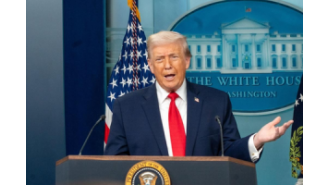Reform UK's journey from a small group of Brexit supporters to a prominent force in mainstream politics.
Farage is back in UK politics as a possible opposition leader, but Reform UK gained popularity without his involvement.

Recent polls suggest that Nigel Farage's party could potentially become the main opposition in the UK. This news has been met with mixed reactions, as Farage's return to the political spotlight has a sense of familiarity for many voters.
Farage rose to fame as the leader of UKIP, playing a crucial role in turning the idea of Brexit into a reality. His party attracted Eurosceptic voters from the Tories, until former Prime Minister David Cameron attempted to appease this threat by calling for a referendum. This decision set a chain of events in motion, resulting in Farage being pushed back to the fringes of politics.
However, he has now reemerged as the head of Reform UK, and is once again capturing the attention of the public with his promise to reduce immigration. This puts current Chancellor Rishi Sunak in a difficult position, as he has overseen a record increase in net migration.
Surprisingly, Reform UK has made significant progress without Farage's direct involvement. Let's take a closer look at how this party has made its way into the mainstream.
Reform UK, previously known as the Brexit Party, was founded in 2019 during a time of intense debate over the UK's departure from the EU. Co-founded by Farage and Catherine Blaiklock, a former UKIP member, the party's main platform was to leave the EU without a deal and abandon negotiations for favorable trading agreements.
However, Blaiklock's past racist and Islamophobic tweets led to her swift removal from the party. After Boris Johnson took over as Prime Minister and adopted a tougher stance against the EU, Farage attempted to form a "Leave alliance" with the Tories in the 2019 general election. Despite being denied, he instructed his party to only field candidates in seats held by the Labour party. Ultimately, the Brexit Party failed to win any seats and only received 2.0% of the vote.
During this time, Farage left the UK to work for Donald Trump's 2020 campaign and became increasingly vocal about his opposition to COVID restrictions. However, he eventually rebranded his party as Reform UK, with a focus on opposing further lockdowns. The party also pledged to tackle "powerful vested interests," such as the House of Lords and BBC, and promised tax cuts.
Since its inception, Reform UK has come a long way. In 2021, leadership was handed over to Richard Tice, and Farage announced his retirement from politics. The party gained its first sitting politician when Michelle Ballantyne, a Tory-turned-independent, joined. However, she was voted out of her position in 2021.
Reform UK remained on the fringes for the next two years and only gained 10 council seats in the 2023 local elections. However, their popularity began to rise after Tory MP Lee Anderson defected to the party earlier this year.
Despite facing defeat in subsequent by-elections, Reform UK made headlines with their success in the 2024 local elections, where they received 11% of the vote. This accomplishment was seen as proof that they were becoming a serious opposition to the Labour party.
Currently, Reform UK has surpassed the Tories in national polls, with 19% of the vote compared to the Conservatives' 18%. This is a significant achievement, although the Tories still hold a lead of at least eight percentage points in the average of multiple polls. Nevertheless, this news has given Reform UK a boost in their efforts to position themselves as a legitimate alternative to the current government.
One of the key policies that has contributed to Reform UK's success is their stance on immigration. Farage's charismatic personality and controversial statements about migrants and asylum seekers have resonated with voters who view immigration as a pressing issue. Reform's main platform revolves around controlling immigration, although they claim to not be against it entirely. They have promised to freeze "non-essential" immigration and implement a "one in, one out" policy. However, they have not clarified who would qualify as "essential" migrants or how they would enforce this quota.
Additionally, Reform has vowed to stop small boat arrivals and place all asylum seekers in secure detention. They have even proposed picking up migrants from boats and returning them to France, as well as setting up offshore processing for illegal arrivals. These measures would require significant changes to the current immigration system and a withdrawal from the European Convention on Human Rights.
In addition to their immigration policies, Reform has also promised significant tax cuts, including raising the income tax threshold and scrapping VAT on energy bills. They have also pledged to cut fuel duty and stamp duty and eliminate inheritance tax. Farage claims that these tax cuts, which would cost the government £40 billion, can be funded through a "stealth levy" on the Bank of England. However, experts have warned that this plan would raise less money than expected and would require tax increases or spending cuts in the future.
Reform's website also states that they would ban "transgender ideology," including "gender questioning," "social transitioning," and "pronoun swapping." This would require a major crackdown on free speech, which is protected under English common law.
Reform UK's success may ultimately depend on whether right-wing voters prioritize immigration in their decision-making process. In the past, the Tories would have pointed out that voting for Reform would only secure a victory for the Labour party. However, with Keir Starmer's chances of becoming the next Prime Minister seeming quite high, some voters may not be afraid to punish the Tories in favor of a party with no previous government experience.










